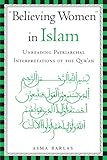"Believing women" in Islam : unreading patriarchal interpretations of the Qur'ān / by Asma Barlas.
Material type: TextPublication details: Austin, TX : University of Texas Press, 2002.Edition: 1st edDescription: xvi, 254 p. : ill. ; 23 cmISBN:
TextPublication details: Austin, TX : University of Texas Press, 2002.Edition: 1st edDescription: xvi, 254 p. : ill. ; 23 cmISBN: - 9780292709041 (pbk. : alk. paper)
- 297.1/2283054 21
- BP 173.4 .B35 2002
| Current library | Collection | Call number | Vol info | Copy number | Status | Date due | Barcode |
|---|---|---|---|---|---|---|---|
| Judith Thomas Library General Stacks | BKS | BP 173.4 .B35 2002 (Browse shelf(Opens below)) | AUA001014 | 1 | Available | AUA001014 | |
| Judith Thomas Library General Stacks | BKS | BP 173.4 .B35 2002 (Browse shelf(Opens below)) | AUA001015 | 2 | Available | AUA001015 | |
| Judith Thomas Library General Stacks | BKS | BP 173.4 .B35 2002 (Browse shelf(Opens below)) | AUA001016 | 3 | Available | AUA001016 | |
| Judith Thomas Library General Stacks | BKS | BP 173.4 .B35 2002 (Browse shelf(Opens below)) | AUA007483 | 4 | Available | AUA007483 | |
| Judith Thomas Library General Stacks | BKS | BP 173.4 .B37 2002 (Browse shelf(Opens below)) | AUA008655 | 5 | Available | AUA008655 |
Includes bibliographical references (p. 237-248) and index.
Contents:
Qur'an and Muslim women : reading patriarchy, reading liberation --
Part I : Texts and textualities : the Qur'an, Tafsir, and Ahadith ; Intertextualities, extratextual contexts : the Sunnah, Shari'ah, and the state --
Part II : Patriarchal imaginary of father/s : divine ontology and the prophets ; Qur'an, sex/gender, and sexuality : sameness, difference, equality ; Family and marriage : retrieving the Qur'an's egalitarianism.
Summary:
sma Barlas develops a new view of reading the Qur'an which goes straight to the heart of Islamic teachings on women, gender, and patriarchy, and which demonstrates the radically egalitarian and antipatriarchal nature of its teachings.
Annotation
"This is an original and, at times, groundbreaking piece of scholarship."--John L. Esposito, University Professor and Director of the Center for Muslim-Christian Understanding, Georgetown University Does Islam call for the oppression of women? Non-Muslims point to the subjugation of women that occurs in many Muslim countries, especially those that claim to be "Islamic," while many Muslims read the Qur'an in ways that seem to justify sexual oppression, inequality, and patriarchy. Taking a wholly different view, Asma Barlas develops a believer's reading of the Qur'an that demonstrates the radically egalitarian and antipatriarchal nature of its teachings. Beginning with a historical analysis of religious authority and knowledge, Barlas shows how Muslims came to read inequality and patriarchy into the Qur'an to justify existing religious and social structures and demonstrates that the patriarchal meanings ascribed to the Qur'an are a function of who has read it, how, and in what contexts. She goes on to reread the Qur'an's position on a variety of issues in order to argue that its teachings do not support patriarchy. To the contrary, Barlas convincingly asserts that the Qur'an affirms the complete equality of the sexes, thereby offering an opportunity to theorize radical sexual equality from within the framework of its teachings. This new view takes readers into the heart of Islamic teachings on women, gender, and patriarchy, allowing them to understand Islam.
